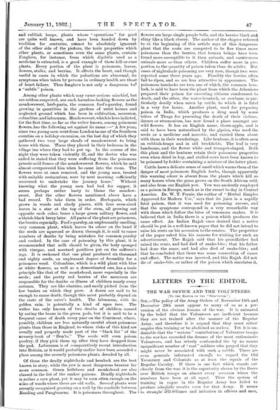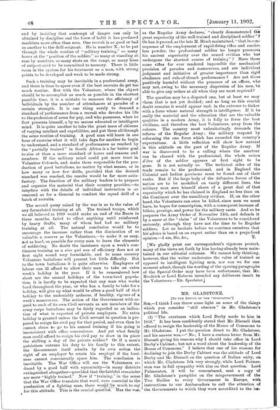LETTERS TO THE EDITOR.
THE WAR OFFICE AND THE VOLUNTEERS.
(To THE EDITOR OF THE "SPECTATOR."] Sin,—The policy of the Army Orders of November 14th and December 24th must appear to many of us as a per- version of the obvious lessons of the war. It is animated by the belief that the Volunteers are inefficient because they are not trained after the manner of the Regular Army, and therefore it is argued that they must either acquire this training or be abolished as useless. Yet it is un- deniable that the " serious " contribution of Volunteer troops to the war has exceeded the dreams of the most enthusiastic Volunteers, and has utterly confounded the by no means insignificant number of " real " soldiers who prayed that they might never be associated with such a rabble. There are even generals infatuated enough to regard the Old Yeomanry and Colonials as at least the equals of the Regular Cavalry. If there is one fact which stands out clearly from the war, it is the superiority shown by the Boers over British troops on almost every occasion where the numbers have been at all equal. Thus the system of training in vogue in the Regular Army has failed to produce adeiVigeresults even for that Army. It seems to stranglelgeff-fgliitnee and initiative in officers and wen;
and by insisting that contempt of danger can only be obtained by discipline and the force of habit it has produced miehines more often than men. One recruit is as good or lead as another to the drill-sergeant. He is number X., to be put through the whole routine of " military training," so many hours at the "position of the soldier," so many at standing at ease by numbers, so many shots on the range, so many lines of outpost-card to be committed to memory. There is little room in the system for his treatment as a man, with strong points to be developed and weak to be made strong.
Such a training may be inevitable in a professional army, and there is time to spare even if the best recruits do get too much routine. But with the Volunteer, where the obj ect should be to accomplish as much as possible in the shortest possible time, it is a mistake to measure the efficiency of individuals by the number of attendances at parades of a certain strength. It is one thing surely to demand a- standard of performance from a recruit who devotes his life to the profession of arms for pay, and who possesses, when he first presents himself, a by no means educated or intelligent mind. It is quite another to take the great mass of citizens of varying intellect and capabilities, and put them all through the same routine of training. A good man will learn in one hour of exercise what it will take days for another to begin to understand, and a standard of performance as reached by the " partially trained " in South- Africa is a far better goal to aim at than a mere standard Of hours and seasons and numbers.' If the military mind could put more trust in Volunteer Colonels, and make them responsible for the pro- duction of good 'battalions, no matter by what means, or in how many or how few drills, - provided that the desired standard was reached, the results would be far more satis- factory. The function- of the military leaders is to prepare and organise the material that their country provides,—to interfere with the details of individual instruction is as unsound as for a General to conduct the squad drill of a batch of recruits.
The second query raised by the war is as to the value of any formulated training at all. The trained troops, which we all believed in 1899 would make an end of the Boers in three months, failed to effect anything until reinforced by heavy drafts, many of whom had had no military training at all. The natural conclusion would be to encourage the increase rather than the diminution of so Valuable a reserve as the Volunteers,—to make it as easy, not as hard, as possible for every man to learn the elements of soldiering. No doubt the insistence upon a week's con- tinnous training as a sine gal non of efficiency does not at first sight sound very formidable, and to some country Volunteer battalions will present but little difficulty. But to the town battalions it is quite otherwise. Employers of labour can ill afford to allow their men to take an extra week's holiday in the year. If it be remembered how short are the annual holidays of the town-bred popula- tion, it is hardly to be expected that any man who works hard throughout the year, or who has a family to take for a holiday, will give up what would be often a good half of that holiday to the undeniably arduous, if healthy, rigours of a week's manmuvres. The action of the Government with re- gard to such of its own Civil servants as are members of the army corps battalions may be fairly regarded as an indica- tion of what is expected of private employers. No extra holiday is granted unless the Civil servant in question is pre- pared to resign his civil pay for that period, and even then he cannot claim to go to his annual training if his going is inconsistent with office convenience. And yet what family man could afford to resign his civil pay to draw in its place the shilling a day of the private soldier? Or if a man's patriotism outruns his duty to his family to this extent, the Government . itself admits by its own action the right of an employer to retain his employe if the busi- ness cannot conveniently spare him. The conclusion is inevitable. The War Office will see the Volunteers re- duced by a good half with equanimity—in many districts extinguished altogether—provided that the faithful remainder are more " highly trained." Now if "training," in the sense that the War Office translate that word, were essential to the production of a fighting man, there would-b much to say
for this attitude. This is the crucial queitia as the war.
• as the Regular Army declares, "clearly demonstrated- the great superiority of the well-trained and disciplined soldier " P Or has it proved, as the late M. BlOch maintained, that in con- sequence of the employment of rapid-firing rifles and smoke-: less
n less powder, the professional soldier o longer possessea his ancient superiority over the armed civilian who has undergone the shortest course of training" ? Have these same rifles for ever rendered impossible the mechanical precision of parades and manoeuvres, and are individual judgment and initiative of greater importance than rigid obedience and rule-of-thumb performance ? Are not these positively harmful without the presence of an officer, who may not, owing the necessary dispersion of his men, be able to give any orders at all when they are most required ?
The question may be a disputed one, but at least we may claim that is not yet decided ; and so long as this crucial doubt remains it would appear rash in the extreme to tinker with a force whose natural strength is intelligence. If it be really the material and the education that are the valuable qualities in a modern Army, it is folly to force the best civilians, and therefore the best Volunteers, away from the colours. The country most unhesitatingly demands the reform of the Regular Army ; the military respond by reforming the one force which has exceeded the country's expectations. A little reflection will show how natural is this attitude on the part of the Regular Army. If war is discovered to be a calling where the amateur can be classed with the professional, the whole raison d'etre of the soldier appears - at first sight to be gone. It is not actually so. The technical sides of the trade remain to the professional, and in England the Colonial and Indian garrisons must be found- out of their ranks. But if the large body of the defensive forces of the nation are to be modelled on vastly different lines, the military man sees himself shorn of a great deal of that superiority which he has claimed in England no less than on the Continent over the unmilitary civilian. If, on the other hand, the Volunteers can once be killed, since men we must have, he hopes for conscription, with a consequent increase of billets, prestige, and power for the military caste. And so he prepares the Army Order of November 14th, and defends it by a sneer at the " claim " of the Volunteers to be considered seriously, although they have not the time to be Regular soldiers. Let us hesitate before we convince ourselves that hie advice is based on an expert rather than on a prejudiced
[We gladly print our correspondent's vigorous protest, many of .the views set forth by him having already been main- tained in our editorial columns, We cannot help thinking, however, that the writer underrates the value of trained as opposed to intelligent fighting men, nor can we for one moment admit, though the wording of the opening paragraphs, of the Special Order may have been unfortunate, that Mr. Brodrick or Lord Roberts intended any deliberate insult to the Volunteers.—ED. Spectator.]







































 Previous page
Previous page